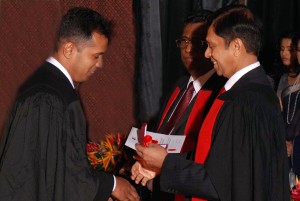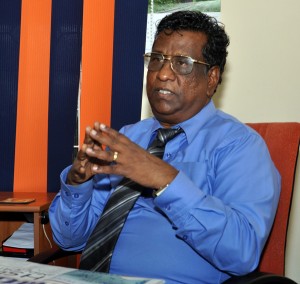IBSL – Your pathway to become a professional in banking
View(s):By Joanne Kotelawala
Education has always been treasured around the world. The current global trends have also enabled various study options to be implemented in many countries around the world. Students now have greater access to educational opportunities and this has  resulted in a rapid increase in qualified professionals, however, the job opportunities rarely match in terms of numbers. Thus an individual has to ensure they stand apart from the crowd and opt to combine a professional qualification along with the academic qualifications. The Institute of Bankers of Sri-Lanka offers an affordable professional qualification that also enables students to gain an academic qualification simultaneously, right here in Sri Lanka. The rapidly expanding financial sector of Sri Lanka translates to the need for more banking professionals, who possess an updated knowledge and skills in the financial sector. Following is an interview with Mr. S.H.A.M. Abeyratne, Director General of the Institute of Bankers of Sri-Lanka.
resulted in a rapid increase in qualified professionals, however, the job opportunities rarely match in terms of numbers. Thus an individual has to ensure they stand apart from the crowd and opt to combine a professional qualification along with the academic qualifications. The Institute of Bankers of Sri-Lanka offers an affordable professional qualification that also enables students to gain an academic qualification simultaneously, right here in Sri Lanka. The rapidly expanding financial sector of Sri Lanka translates to the need for more banking professionals, who possess an updated knowledge and skills in the financial sector. Following is an interview with Mr. S.H.A.M. Abeyratne, Director General of the Institute of Bankers of Sri-Lanka.
IBSL is a long-standing institute that offers a recognised professional qualification in banking and finance. How did the institute start and how has it grown and expanded over the years?
 The Institute of Bankers of Sri-Lanka is a professional body that was set up in 1964 by the Central Bank of Sri Lanka and the institute was incorporated by a Parliament Act in 1979. The main purpose behind the setting up of this institute was to provide an education in Banking and Finance for banking and non-banking personnel. The main purpose behind the setting up of this institute was to educate and update those interested in pursuing a career in banking and finance. It was with this objective in mind that, in the year 2000, we decided to also cater to school leavers and undergraduates at university. So we were able to widen the scope of IBSL and provide not only a professional qualification but also a preliminary academic qualification. Our Sri-Lanka education system does a good job with providing students with knowledge. At IBSL we cater to students through teaching methods in all three languages, that is, English, Sinhala and Tamil. We help students to achieve the all important balance in academic and professional qualifications, thus ensuring they stand-out from the masses when it comes to employment prospects. IBSL is also the authorised institute for conducting banking examinations. The governing board consists of high ranking banking professionals, the Chairman is always the Deputy Governor of the Central Bank, Vice Chairman is the Assistant Governor of the Central Bank, in addition the board consists of three Chief Executive Officers from leading state banks, and Chief Executive Officers and senior officials from the private sector banks. Three Associates are elected to serve as members on the board as well. This ensures that a high quality and industry relevance is maintained in the educational programmes that we offer.
The Institute of Bankers of Sri-Lanka is a professional body that was set up in 1964 by the Central Bank of Sri Lanka and the institute was incorporated by a Parliament Act in 1979. The main purpose behind the setting up of this institute was to provide an education in Banking and Finance for banking and non-banking personnel. The main purpose behind the setting up of this institute was to educate and update those interested in pursuing a career in banking and finance. It was with this objective in mind that, in the year 2000, we decided to also cater to school leavers and undergraduates at university. So we were able to widen the scope of IBSL and provide not only a professional qualification but also a preliminary academic qualification. Our Sri-Lanka education system does a good job with providing students with knowledge. At IBSL we cater to students through teaching methods in all three languages, that is, English, Sinhala and Tamil. We help students to achieve the all important balance in academic and professional qualifications, thus ensuring they stand-out from the masses when it comes to employment prospects. IBSL is also the authorised institute for conducting banking examinations. The governing board consists of high ranking banking professionals, the Chairman is always the Deputy Governor of the Central Bank, Vice Chairman is the Assistant Governor of the Central Bank, in addition the board consists of three Chief Executive Officers from leading state banks, and Chief Executive Officers and senior officials from the private sector banks. Three Associates are elected to serve as members on the board as well. This ensures that a high quality and industry relevance is maintained in the educational programmes that we offer.
You mentioned that IBSL improves a student’s employment prospects once they complete their education. How does IBSL aim to address the rift between the education and employment?

S.H.A.M. Abeyratne
Yes, as I mentioned, it is very important for students to stand apart from the rest. The Sri Lankan economy is now at a rapidly developing stage, and taking a look at the statistics we see that 60% of that growth is due to the service sector. The banking and finance sector accounts for 12% of the service sector, thus it is a rapidly growing sector for job opportunities. There are approximately 50,000 individuals in banking service with around 3000-4000 job opportunities opening up annually. Thus the competition is intense. Our students gain a vast amount of practical knowledge and are taught by experts and leading lecturers in the field of banking and finance. Thus employers prefer to select candidates with the IBSL qualification. Our students are updated with the latest information. Our students receive a wide scope of knowledge in areas such as management, marketing, sales, customer service, accounts, general law principles, corporate governance, and information management in addition to the banking and finance subjects. Thus students are fully equipped with a wide knowledge and are able to be productive individuals in the work environment. Thus their employment prospects are considerably higher.
What are the study routes offered to students and how can they also gain access to an academic qualification?
The first stage we offer is the Certificate in Banking and Finance, which is suitable for post Ordinary Level students as well, provided that they meet the admission criteria. The certificate course is one year in duration and covers the same variety of topics such as marketing, management, general law principles etc. Upon completion of the certificate level, the next stage is the Diploma in Banking and Finance which offers a more in-depth focus in to the subjects and the sub-components. The Diploma is also one-year in duration. Upon completion of the Diploma stage students can gain access to the final year of the Bachelor’s degree in Leadership and Management from Northumbria University, United Kingdom. Students are able to complete the bachelor’s degree in Sri-Lank at the Northumbria University campus. Future plans of IBSL include the construction of a modern building for classes, and we also plan on introducing a distance learning package. We are also currently in the process of seeking degree awarding status from the University Grants Commission. Furthermore, our DBF qualification has been recognised not only by the local universities, but also by the foreign universities for enrolment of Master degree programmes. DBF qualified students are now able to register to pursue the BSc. (Hons) degree in Banking Practice and Management at ifs UK. This is a great opportunity for our DBF qualified students to acquire internationally recognised academic qualification in Banking and Finance. The future is set to be bright for IBSL and we welcome students to join us and gain knowledge, a career and be competent in the future with a qualification recognised both locally and internationally.
Follow @timesonlinelk
comments powered by Disqus
















